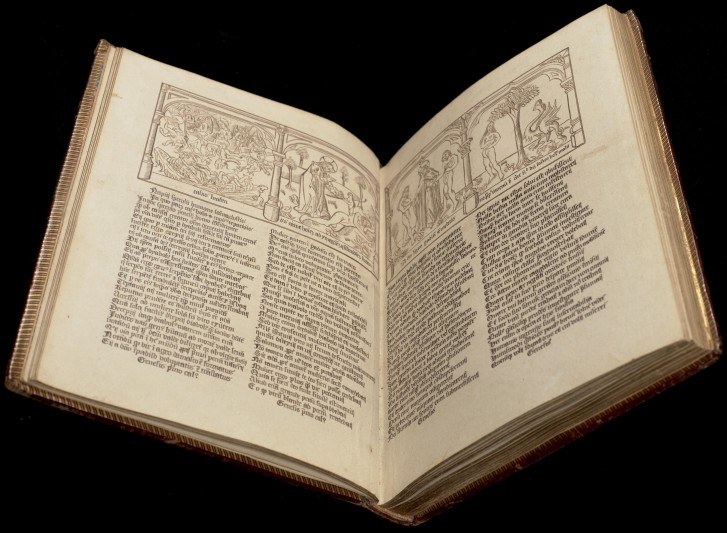Julianne Simpson, Collections and Discovery Manager writes: The John Rylands Research Institute and Library (JRRIL) is very grateful to the Friends of the National Libraries for its generous grant to support the acquisition of this illustrated manuscript on large paper executed by Jacques Fucien Lesclabart, one of the most famous French calligraphers of the 18th century. This manuscript reproduces the text and woodcuts of the second Latin xylographic edition of the Speculum humanae salvationis, originally printed in the Netherlands around 1475, a copy of which is already at the JRRIL.
The original Latin edition of the Speculum is one of four related books, two in Latin and two in Dutch, which remain mysterious to historians of printing even to this day. From the late 16th century they became associated with a rival claim for the invention of printing in Haarlem by Laurens Jansz Coster. The Rylands copy is on display in our current exhibition, Transitions in Print, which explores how scientists, historians and imaging specialists are joining forces to develop tools and new ways of looking at these historic documents using cutting-edge techniques, giving us new insights into our earliest printed heritage. The ink used in our copies of the Latin and Dutch editions have been analysed using X-ray fluorescence spectroscopy (XRF) in order to gain a better understanding of the techniques used in their production.
The context for the production of this manuscript is intimately intertwined with the development of book history, bibliophily and collecting in the 18th and early 19th centuries. When Lesclabart produced this facsimile around 1780, genuine blockbooks were scarce in commerce and this would have appealed to the high-end bibliophilic market. Another Lesclabart facsimile, sold in 2021, was owned by one of Earl Spencer’s contemporaries Stanesby Alchorne. The provenance of this newly-described copy shows that it circulated in similar circles: it contains the bookplate of the Lloyd family of Leaton Knolls in Shropshire, presumably acquired by John Arthur Lloyd, also a member of the Roxburghe Club.
The manuscript is an important addition to our collection, enhancing the study of the blockbook from several perspectives. Earl Spencer was actively pursuing blockbooks from the 1790s and his collection, which includes some of the most notable individual copies in the world, has ensured that Manchester now has one of the most significant collections of xylographic books. The recent redating of a woodblock in our collection and the discovery of its association with John Bagford, offers rare opportunities to study the first flurry of scholarship around xylographic printing in the 18th century. The Lesclabart manuscript is evocative of Spencer, of bibliomania and of a period of connoisseurship and collecting which is of considerable academic interest at present.
